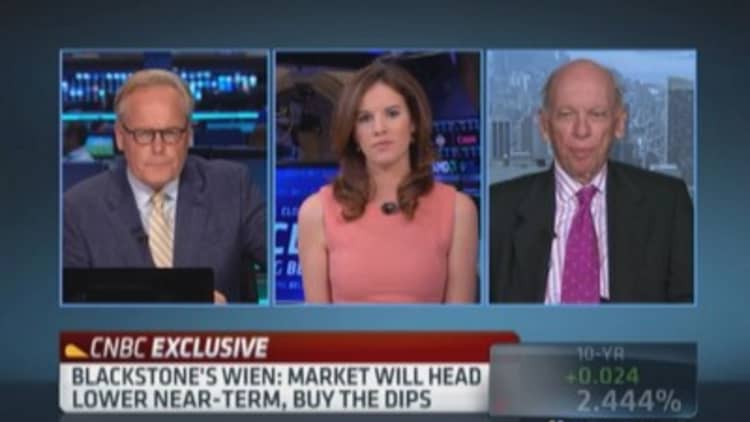Some of the most powerful members of the financial community think the American economy is going to be just fine.
That was the consensus reached by an elite group of about 90 "hedge fund managers, corporate leaders, activists, buyout specialists, real estate titans, private equity folk and venture capitalists" assembled by Byron Wien, Blackstone Advisory Partners vice chairman, for his annual series of lunches in the Hamptons in August.
Read MoreAmericans are growing more negative on the economy
"Investors almost universally believed that all of the threatening geopolitical problems would somehow work themselves out favorably without significantly disturbing the United States economy or its financial markets," Wien wrote in a monthly commentary letter released Thursday night.
"I was struck by the optimism about the outlook for the U.S. in the face of the unsettled conditions around the world," Wien added, noting turmoil in the Middle East, economic problems in Europe and tensions in Ukraine.
Read MoreBull market crisis: Rosé runs dry in the Hamptons
Wien himself appeared more cautious.
"I wondered if our economy could continue to thrive in the face of so many problems elsewhere," he wrote. "On top of that you had the threat of cyberwarfare and terrorism. Our political process seems unable to respond to the challenges confronting the U.S. and inequality is a growing problem. Can America move ahead economically at a satisfactory job-producing pace with all these conditions in front of us?"

Another point of consensus among the "1 percent" crowd—a name bestowed on the richest by the Occupy Wall Street protesters—was frustration with President Barack Obama and Washington in general.
"The group felt they had lived through six years of a failed presidency and the next two years were unlikely to be better," Wien wrote. "Almost anyone—Democrat or Republican—who took over the office in January 2017 was likely to be an improvement."
"Almost everyone was pessimistic about the U.S. government's ability to get anything done for the next two years," the letter continued. "The polarization of Congress is too extreme."
Wien said there was no clear presidential candidate favorite from the group, but the attendees viewed Hillary Clinton as the likely Democratic nominee and Jeb Bush "had some enthusiastic supporters because of his ability to attract Hispanic supporters and his grasp of the issues."
Read MoreHere's what keeps Blackstone's Byron Wien up at night
Wien noted that there was "little apprehension" about the "dangers of pandemics, global warming or inadequate water supplies to sustain life as we know it."
At least one unusual economic threat was brought up by one unnamed investor: the "possibility that a nuclear detonation from a satellite over North America could release an electromagnetic pulse which would knock out the electricity grid across the United States, causing famine and chaos."
That's similar to a recent warning by billionaire hedge fund manager Paul Singer on the danger of the same type of "EMP" attack, events that can occur naturally from solar storms or artificially from a high-altitude explosion of nuclear weapons.
Read MorePaul Singer: This threat is 'head-and-shoulders' above all others
—By CNBC's Lawrence Delevingne






